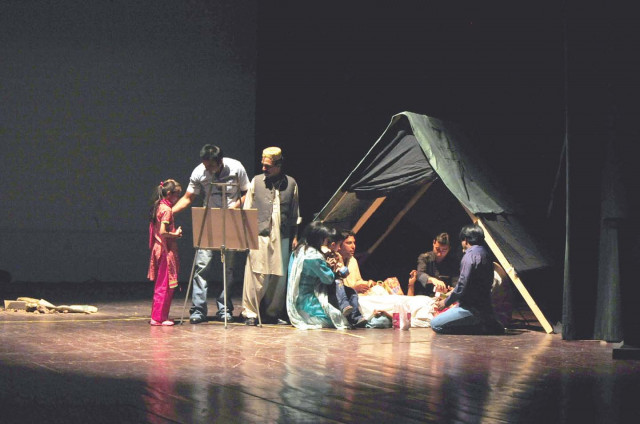Theatre: Taliban atrocities and all that is ‘haraam’
Though lacking novelty ‘Funkar’ managed to deliver the intended message.

After three consecutive comedy plays, Nautanki Theatre Rawalpindi produced its first serious play “Funkar” in the on-going Drama Festival at Pakistan National Council of the Arts (PNCA) on Saturday. Though lacking novelty, the play’s lead funkar (artist) managed to deliver the intended message.
For audience seeking entertainment, the play was a simple depiction of Taliban atrocities in Swat and how they imposed their own version of Islam and Shariah on the people, sparing none, not even the local amiable artists. Finally, it was the Pakistan Army that comes to the rescue, concluding with a conventional happy ending reserved for most contemporary Urdu dramas.
For those who came to see something of note undoubtedly returned with a bad taste. Nevertheless, the hour-long play attracted a full-house, and the audience was responsive.
One man in the audience was so moved by the depiction of military operation in Swat that he got up in the middle of play, in the jam-packed hall, and shouted, “Pak Army Zindabad” (Long Live Pakistan Army).
The story revolved around a man, played by Aftab Anwar, who is a painter and sculptor based in Swat, where Taliban had imposed their Shariah.
Khan Iqbal, a representative of Taliban declares Aftab’s painting and sculpturing haraam, following which a Qazi (Muslim judge) passes judgement to amputate Aftab’s hand as punishment for his ‘wrongdoings’.
The artist buries his works and tools to bargain concessions but eventually fails. Finally, he bows down before God in prayers seeking help, which bear timely fruit and the Pakistan Army comes as his messiah, an angel of mercy. The painter’s hands are saved.
The script was plain and mostly predictable, lacking the element of suspense right from the beginning. The play, too fast-paced for the subject, made Anwar’s – the play’s director and writer – lack of experience at serious theatre apparent.
Where only music should have sufficed, the play had dialogues, and where a monologue was required, the protagonist gave a commentary in an attempt to instil emotions. The background music was poorly synchronized that it lost its impact throughout the play.
The actors, however, put in their best and Anwar as a protagonist was well-supported by the audience.
Published in The Express Tribune, May 16th, 2011.



















COMMENTS
Comments are moderated and generally will be posted if they are on-topic and not abusive.
For more information, please see our Comments FAQ